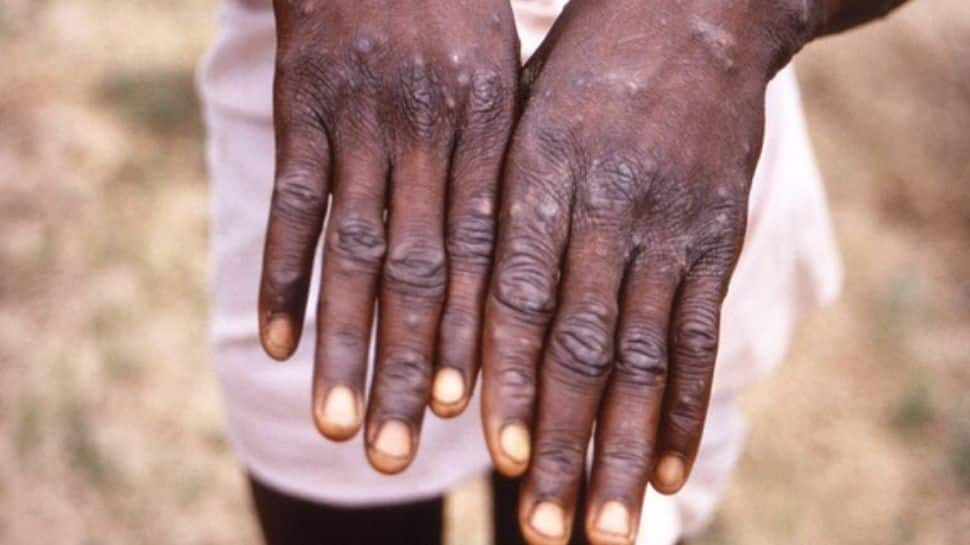Monkeypox: Cases reported in US, UK, parts of Europe; UK alerts gay, bisexual men about virus
Monkeypox is a rare but potentially serious viral illness that typically begins with flu-like illness and swelling of the lymph nodes and progresses to a rash on the face and body, say experts
- Monkeypox puts virologists on the alert because it is in the smallpox family, although it causes less serious illness
- This virus does not spread easily among people but transmission can occur through contact with the body fluids
- Suspected cases may present with early flu-like symptoms and progress to lesions
Trending Photos
) Pic: IANS
Pic: IANS Monkeypox virus infection is on the rise in Europe and on Wednesday, US' Massachusetts Department of Public Health confirmed a single case of monkeypox virus infection in an adult male with recent travel to Canada, the Commonwealth of Massachusetts said in a press release. A handful of cases of monkeypox have now been reported or are suspected in Britain, Portugal, Spain and the United States.
What is Monkeypox?
"Monkeypox is a rare but potentially serious viral illness that typically begins with flu-like illness and swelling of the lymph nodes and progresses to a rash on the face and body. Most infections last 2-to-4 weeks. In parts of central and west Africa where monkeypox occurs, people can be exposed through bites or scratches from rodents and small mammals, preparing wild game, or having contact with an infected animal or possibly animal products," the Massachusetts Department of Public Health statement reads.
Symptoms of Monkeypox
Monkeypox is a virus that causes fever symptoms as well as a distinctive bumpy rash. It is usually mild, although there are two main strains: the Congo strain, which is more severe – with up to 10% mortality – and the West African strain, which has a fatality rate of more like 1% of cases.
Suspected cases may present with early flu-like symptoms and progress to lesions that may begin on one side on the body and spread to other parts and the illness could be clinically confused with a sexually transmitted infection like syphilis or herpes, or with varicella zoster virus.
Here are some symptoms:
- Fever
- Headache, muscle aches, backache
- Swollen lymph nodes
- Chills
-Exhaustion
- Rash can develop, often beginning on the face, then spreading to other parts of the body including the genitals. The rash changes and goes through different stages and can look like chickenpox or syphilis, before finally forming a scab, which later falls off.

A CDC image shows a rash on a monkeypox patient (Pic: Reuters)
Monkeypox: How does it spread?
The virus spreads through close contact, both in spillovers from animal hosts and, less commonly, between humans. It was first found in monkeys in 1958, hence the name, although rodents are now seen as the main source of transmission.
This virus does not spread easily among people but transmission can occur through contact with the body fluids, monkeypox sores, items that have been contaminated with fluids or sores (clothing, bedding, etc.), or through respiratory droplets following prolonged face-to-face contact. The virus can enter the body through broken skin, the respiratory tract, or through the eyes, nose, or mouth.
The UK Health Security Agency (UKHSA) said people without symptoms are not considered infectious but, as a precaution, those who have been in close proximity of the infected patients are contacted to ensure that if they do become unwell they can be treated quickly.
The UK Health Security Agency's alert also highlighted that the recent cases were predominantly among men who self-identified as gay, bisexual or men who have sex with men, and advised those groups to be aware.
Virologists on alert
Monkeypox puts virologists on the alert because it is in the smallpox family, although it causes less serious illness. Smallpox was eradicated by vaccination in 1980, and the shot has been phased out. But it also protects against monkeypox, and so the winding down of vaccination campaigns has led to a jump in monkeypox cases, according to Anne Rimoin, an epidemiology professor at UCLA in California.
Stay informed on all the latest news, real-time breaking news updates, and follow all the important headlines in india news and world News on Zee News.
Live Tv







)
)
)
)
)
)
)
)
)
)
